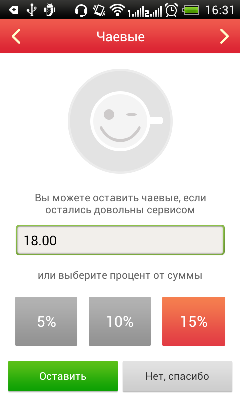We drove you to tea

In large cities, the situation is not uncommon when, even in the “shop around the corner,” citizens walk with a bank card without the amount of cash with them. If the cache is present in your pocket, then the maximum is to pay for public transport. Credit cards are gaining popularity, pushing aside traditional wallets. The future imperceptibly diffuses between cash wallets. It’s good or bad for everyone to decide for themselves, but the fact that it is easier and faster to pay with a card (and therefore more and more people will do it every day) cannot be denied.
Now non-cash money is the highest level of financial evolution, so the “population” of service and services is forced to adapt to the existing realities in order to “keep up with the older ones”. And one of the conditions to which it must adapt is receiving a tip from a bank card.
')
In connection with the Eurocentric sentiments of big cities, the tradition of leaving tea even for a business lunch is becoming more and more ingrained in the mentality and acquires the status of not just good taste, but also the right image. And since we remember that now the city dweller has no cash, but there is a need to behave like a decent European and leave a tip, it is logical to assume the magnitude of the dissonance in his head.
In this case, there are two ways:
1. After lunch, a taxi ride or after receiving a product from the courier, the client asks to “wait for him a couple of minutes” and disappears in search of the nearest ATM to withdraw a certain amount for tea (suppose that he had paid for the service with a card before). Sometimes for this you have to spend a lot of time, as a result, the employee loses time for which he could earn more than the amount of tips.
2. A courier, a waiter or a taxi driver, after serving, silently pulls the mobile terminal to the client to pay with a bank card, in the functionality of which the option is immediately set to leave a tip, as well as a certain amount, and a percentage of the total check.
Well, you can just not pay. But is it necessary?
According to the civil legislation of the Russian Federation, payment of tips may be interpreted as “receiving income in cash or in kind from other individuals by way of donation”, that is, by way of gratuitous transfer of the amount not subject to taxes. This is explained by the fact that there is no counter-obligation on the part of the donee employee, since the client did not use the services of a specific individual, but of the company. In this case, importantly, tips are given after the execution of the contract.
But overseas, in accordance with US law , the tips received by the taxpayer are subject to declaration and taxation. The existing National Restaurant Association of the United States strongly recommends leaving at least 15% of the tip, and in the case of good and excellent service - all 20%. American taxi drivers, despite the absence of their national association, may not give customers change at all under the pretext of "legitimate tips."
Tips from the card are taxed in any country, reducing the size of the actual remuneration - this is not very convenient for the employee, but increases the company's turnover and transparency of reporting. In this case, the amount of "tea" turns into a kind of "interest for service", which is practiced by some cafes and catering companies, but unlike it does not violate the rights of consumers. The fact is that the automatic inclusion of an additional percentage in the check obliges the service to notify its customers until they receive the service, but this rule is often not fulfilled. In the case of a tip, the percentage takes on a voluntary form and, therefore, does not violate any rights.
Why has the tip conversation already taken over 3.5k marks?
Because this traditional, permanent, and often the main source of income for service workers and services still does not have a standardized form adopted by all parties and does not answer the questions: how, what and why should you pay?
LifePay Company offers its simple and understandable solution: we enter tips into a general check with the help of a mobile terminal for receiving bank cards, which the smartphone itself turns into. For this, even a second card rental is not necessary - everything is done transparently and in front of the client, moreover, he himself chooses the amount or percentage of the check. The principle itself has already been described here before.
Tips carried out through mPOS go to the company's current account along with the total amount of payment. Money comes to the account the next day, tips are counted as a separate line. The employer himself determines the way this amount is distributed. Directly - when tips are given directly to the employee to whom they were intended, or indirectly - when the “common tea” is distributed among other personnel workers (for example, between dishwashers, bartenders, chefs and waiters).
This approach:
- Solves the issue of legalization of tips (they no longer encourage tax evasion and are delimited with a bribe)
- Draws up the tradition of paying tips to staff in general
Source: https://habr.com/ru/post/201348/
All Articles